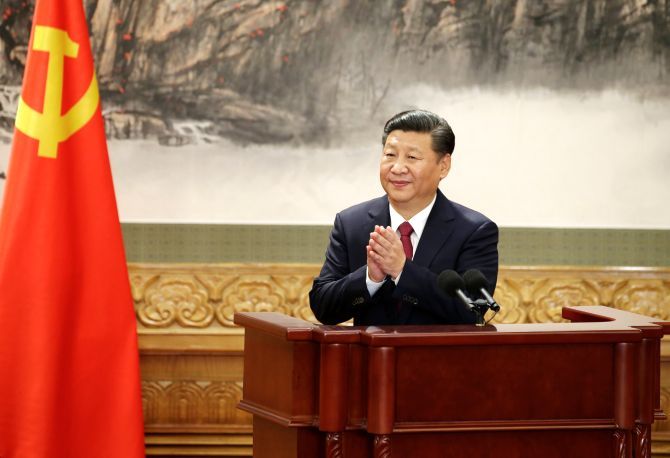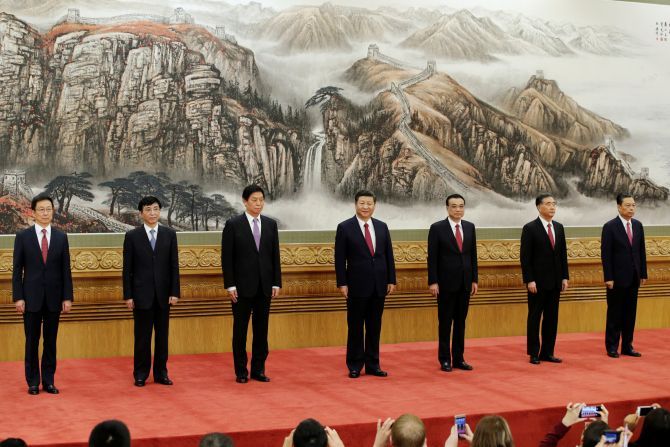 | « Back to article | Print this article |
The Politburo Standing Committee -- the most powerful body in China -- is unveiled, but in a break from Communist party convention, no successor to Xi Jinping is named.

China’s ruling Communist Party on Wednesday unveiled its new leadership headed by President Xi Jinping to rule the world’s second largest economy for the next five years with no clear hint of a heir apparent, leaving room for him for an unprecedented third term.
In the most-widely watched political event telecast live across the world, Xi, 64 walked in front of the national and international media followed by the number two ranked leader, Premier Li Keqiang and five other new members of the Politburo Standing Committee which will rule the country for the next five years.
Looking relaxed, Xi introduced all the six members to the packed local and international media at Beijing’s massive Great Hall of the People and then spoke about his vision for China and the world.
Besides Xi and Li, the other members of the ruling council are Xi’s chief of staff Li Zhanshu, 67, vice premier Wang Yang, 62, leading Communist Party theoretician Wang Huning, 62, party organisation department head Zhao Leji, 60, and Shanghai party chief Han Zheng, 63.
The new faces replaced leaders who had reached an informal retirement age of 68.
The age of the new leadership gives an indication that none of them could succeed Xi at the next party Congress in 2022.
The announcement follows the end of the week-long Communist Party National Congress, the biggest event in China’s political calendar, which is held every five years.
The CPC Congress on its final day on Tuesday amended its Constitution to add Xi’s name and ideology, elevating him on par with modern China’s founder Chairman Mao Zedong and his successor Deng Xiaoping.
Till now, only the thoughts of Mao and Deng were enshrined in the Constitution of the world’s longest ruling Communist Party, interpreting the complex doctrine of Marxism with Chinese characteristics.
The thoughts of Deng, China’s reformist leader, were added posthumously.
Thoughts of two of Xi's predecessors, Jiang Zemin and Hu Jintao, were mentioned in the Constitution but not their names. This makes Xi only the third leader to have his thoughts on governance enshrined, which will now be part of school textbooks all over China.

Addressing the media after introducing the new committee, Xi spoke of how China will steadfastly uphold sovereignty and its security and interests.
“With confidence and pride, the Chinese people will be steadfast in upholding our country’s sovereignty, security and development interests,” he said.
Xi said China will work with other nations to build a global community with a shared future, and make new and greater contributions to the noble cause of peace and development for all humanity.
He said the CPC will generate waves of positive energy to build the country into a mighty and nationwide force driving its development and progress.
“We must continue to rid ourselves of any virus that erodes the Party's fabric, make great efforts to foster a healthy political environment of integrity, and generate waves of positive energy throughout our Party,” Xi said.
The CPC will mark its centenary in 2021. Xi’s ideological thoughts enshrined into the Constitution spoke of development of China in the modern era under the leadership of CPC keeping alive the one-party system in the country.
“For a party which fights for the eternal well being of the Chinese nation, the centenary only ushers in the prime of life,” Xi said.
“As the world’s largest political party, the CPC must behave in a way commensurate with this status. Its history makes it abundantly clear that the CPC is capable of not only spearheading a great social revolution, but also imposing a great reform on itself,” he said.
Xi, who in the past warned about the collapse of the Soviet Communist Party in 1991 and asked the CPC members to draw lessons from it, said the party members, must always have a youthful spirit, and forever be the servants of the people and the backbone of our nation.
“Exercising full and rigorous governance over the Party is a journey to which there is no end. We should never entertain the idea of taking a breather or halting our steps," he said apparently referring to massive anti-corruption campaign carried out by him in the last five years in which over a million party officials were punished.
“The aspirations of the people to live a better life must always be the focus of our efforts,” said Xi.
“I have no doubt in my mind that our people's lives will see further improvement year after year,” he said.
He reiterated the resolve to establish a moderately prosperous society in all respects by 2020.
“This is a society to be enjoyed by each and every one of us; on the march toward common prosperity, no one must be left behind,” he said.
“We will mobilise the whole Party and the whole country in a resolute push to deliver on our pledge and eradicate poverty in China,” he said.
The CPC and the Chinese people have gone through trials and tribulations, Xi said, leading a new top CPC leadership to meet the press.
“These experiences have taught us that peace is precious and development must be valued,” he said.
He also thanked the national and international media for the coverage of the party Congress and said his government is open for constructive suggestions.
“We do not need lavish praise from others, however, we do welcome objective reporting and constructive suggestions, for this is our motto: 'Not angling for compliments, I would be content that my integrity fills the universe,'" Xi said.
He encouraged members of the press to visit and see more of China, citing a Chinese saying that ‘it is better to see once than to hear a hundred times’.
“We hope that after the Party Congress, you will continue to follow China's development and progress, and learn about and report on more dimensions of China,” he said.
Over the past five years, China’s Gross Domestic Product rose from 54 trillion yuan ($8.2 trillion) to 80 trillion yuan, contributing more than 30 per cent of global economic growth.
The composition of the Standing Committee this time is regarded as little more balanced with members from other factions of the CPC, which has monopolised political power ever since the People's Republic was founded in 1949.
Xi’s close supporter Li Zhanshu will head the parliament the National People’s Congress while Zhao Leji will head the party's powerful disciplinary body which carries the anti-corruption campaign.
Zhao replaces Xi's close aide Wang Qishan, 69 who retired after the Chinese president apparently failed to get him an extension at the Congress.
Premier Li is widely regarded as the choice of previous President Hu Jintao. The Standing Committee composition is widely regarded as balanced with two members backing Xi, two from Hu and two others from the group headed by another former President Jiang Zemin, 91 who continue to retain some hold over the party especially in Shanghai and sections of the powerful military.
Analysts looking at the composition of the Standing Committee say it appears to be an outcome of compromise between Xi and other factions in the party.
The list of new faces underscores Xi’s desire for continuity and consensus-building, but it also prepares the ground for greater changes in the future, Hong-Kong based South China Morning Post reported.
But more importantly the party has not kept its decades old tradition to hint or nominate a successor to Xi.
Judging from the age group of the Standing Committee members, all the seven members including Xi will have to retire following unofficial retirement age of 68 years.
The successor has to be in mid-fifties but the lowest age in the Standing Committee is 60 years. Lack of successor could disrupt the decades old leadership system followed by the party, according to observers.
The party leaders in recent decades hinted at one or more possible heirs to the Standing Committee at the beginning of their final term, indicating a line of succession.
Xi and Li themselves were picked up in the 17th CPC Congress that way when they were in fifties. This leaves room open for leadership when the party hold its key Congress in 2022.
Observers say lack of a successor points to a possibility for Xi to explore an unprecedented third term and beyond as he has already attained iconic status conferred on Mao and Deng by enshrining his ideologies into the CPC Constitution.
Robert Lawrence Kuhn, author, an American scholar on China who moved closely with Chinese leaders and scholars for decades, said the inclusion of Xi’s thoughts in the Constitution and the ‘core leadership’ conferred on him by the party previously put him ‘substantially ahead of others’ in the party.
“Being the originator of the new concept and the arbiter of what constitutes social Chinese characteristics for a new era and his being core, those two factors put Xi substantially above anybody else or any combination of people,” Kuhn who is based in China told PTI on Tuesday after the CPC concluded its Congress.
He also said ‘there is no term limit for your name in the constitution’ referring to the iconic status enjoyed by Mao and Deng, which meant that Xi could set his sights beyond the second term.
Since 2002, all the top Chinese leaders followed a convention of retiring after two terms. Also 68 years as unofficially agreed as retirement age. So this many not be applicable to Xi, he said.
But that said, Xi apparently did not have his way completely with the leadership election this time.
Earlier reports said Xi preferred a five-member Standing Committee instead of seven. It was shrunk to seven from nine when he took over power in 2012.
But now the number of the Standing Committee remained seven keeping it broad based.